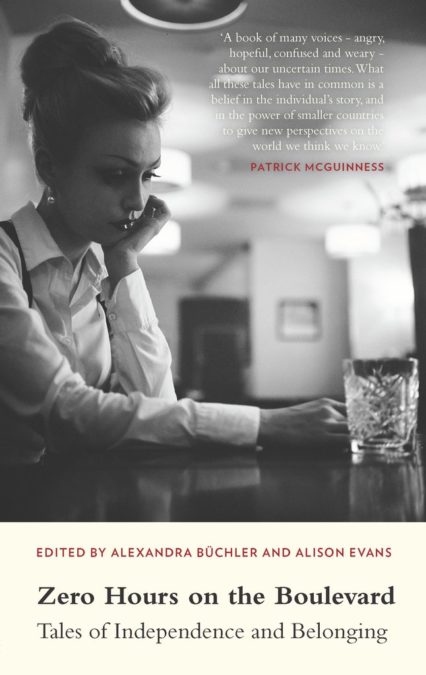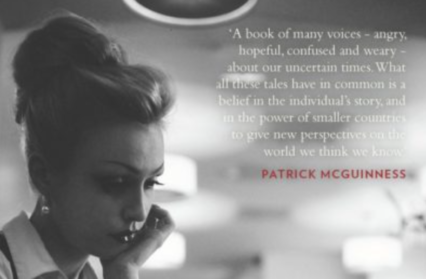Kathryn Tann reviews Zero Hours on the Boulevard, a new Brexit anthology of European writers, produced by Parthian Books.

Zero Hours on the Boulevard (Parthian) shows its reader how little they really know of worlds beyond their own; how vast the rifts between cultures and countries often are. But it will also show a reader, carefully and gradually, that regardless of place or language, really we’re all the same. Collecting together pockets of experience in an anthology such as this demonstrates, at the most crucial time, how the only rifts are those which we create. The simple act of translating, collating, and exploring scattered words is a powerful one, especially as we head into an increasingly confused world of independence and dependence.
The touchstone of these collected stories is Wales – unsurprisingly, as the work is a collaborative effort between independent publisher Parthian, and the organisation Literature Across Frontiers – but it reaches out to unexpected corners, bringing thought-provoking writing from all over Europe back to Wales with a sharp relevancy. It also demands connections between Wales and other European countries that needn’t take place via a membership to Great Britain.
Zero Hours on the Boulevard comprises of thirteen specially commissioned stories, all of which have been written in mind of recent unsettlement. Opening with a poem which pulls a single person’s multiple belongings together – by Hanan Issa – the collection goes on to span Malta, Catalonia, Dublin, Cameroon; big cities, Welsh valleys, suburbs, small towns; streets full of disorder and a boulevard swamped with tourists. All to name but a few.
And of course, the atmosphere and quality of the stories also vary. The most memorable moments begin early on, with the direct style of Catalan writer Albert Forns: the on-the-ground account of what is often only fleetingly seen panning across the television screen, the personal journalism of it, and the occasional command to ‘look it up’ or ‘Google’ what he talks of. The next story, another translation, leads the reader into a deep sense of the dark reality of many metropolitan lives: the small things that give hope, and the bigger powers that take it away (this, ‘The Garden’ by Uršul’a Kovalyk, was among the most powerful pieces). ‘Courtyard Smells’ by Karmele Jaio feels vivid too. It explores that ‘grass is greener’ attitude through the frustrating but familiar character of a young mother who feels superior to her upbringing. It suggests how common it might be for people to feel ashamed of, or at least a disconnection from, the environment that created them; and that many lives are shaped by longing, rather than belonging.
Not all the stories in this anthology will get cogs turning quite so profoundly. Zero Hours on the Boulevard has its ebbs and flows, and while you may be carried by the current of some pieces, you may find yourself having to wade through others. This, however, could easily be a matter of preference. Short stories are a very personal thing: they come in all shapes and sizes, built to suit some and not others. In bringing together so many separate voices, there is bound to be the odd dispute – and aren’t those conversations what literature like this is all about?
‘Glitch’ by Oisin Fagan and ‘Mercy’ by Lloyd Markham, being somewhat dystopian, seemed like a jolt to the carousel of otherwise naturalistic snapshots. However, they are both undeniably good stories, and lend themselves to the variation within the collection. They are glimpses of what could be: challenges to the reader – less passive – provoking questions for the way things are going, rather than reflections on the way things already are.
The anthology ends with ‘GB Has Left the Group’ by Siôn Tomos Owen. Tackling Brexit directly and through a pseudo ‘group chat’, this story had the potential to be forced or predictable. It is, however, a very vivid, balanced and insightful window into the on-the-ground effects of current British politics. It was stark, witty, truthful – and the decision to frame the piece around modern social media was actually far from gimmicky. It captures a country waking up to a life-changing referendum result: it is one of the first to do it, and it is done well. It also brings the anthology back around to Wales, and with all those fresh insights swimming thoughtfully in tow.
Zero Hours on the Boulevard is not earth-shaking. It is, however, quietly truthful; a reminder of how our experiences do translate across ‘frontiers’, and that events like Brexit can’t ignore the fact that we live in an increasingly global world. It is well collated, perfectly timed, and certainly not predictable – and it doesn’t seem to be jumping on the Brexit bandwagon hoping to sell some stories. No; it is harnessing the power of literature to reach out to various corners of Europe despite our uncertain circumstances, not because of them.
Zero Hours on the Boulevard: Tales of Independence and Belonging is available now from Parthian. In support of this book, a series of readings has been organised and will feature various contributors from the anthology, it will be taking in London, Cardiff, Aberystwyth and Bangor; more details can be found here.
Kathryn Tann is an editor at Parthian Books











